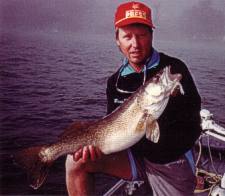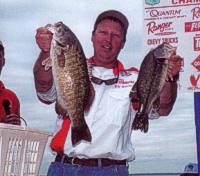Inside: with Ministry of Natural Resource's
Information Assistant Wil Wegman by Mike Skyba
 Wil
Wegman states, "Its hard to argue against my wonderful wife's keen
observation that my entire life seems to be focused around fishing".
I talk fishing at work, I fish at least 100 times a year. I write
about fishing as a freelance writer, I give fishing seminars
as an angling instructor, and I am kept busy with fishing related
subjects as the Conservation Director for the Ontario B.A.S.S.
Federation. Basically, I sleep, breath and eat fishing". Wil
Wegman states, "Its hard to argue against my wonderful wife's keen
observation that my entire life seems to be focused around fishing".
I talk fishing at work, I fish at least 100 times a year. I write
about fishing as a freelance writer, I give fishing seminars
as an angling instructor, and I am kept busy with fishing related
subjects as the Conservation Director for the Ontario B.A.S.S.
Federation. Basically, I sleep, breath and eat fishing".
Over the years, Wil has refined his interest in the
sport to become a very species - specific angler. Namely, during the
hard water season, Wil's 30-40 or so times on the ice are usually
spent chasing yellow perch. The occasional whitefish, lake trout,
walleye, pike and crappie outing also take place in winter. In
the spring, some pike, and walleye angling followed by the
occasional trip for crappie, and perch. "Once the bass opener
comes through, nothing else really matters, and another 40 trips
at least are spent chasing largemouth bass and smallmouth bass…I
love them both".
"Tournament fishing excites me even after all these
years. My first tournament was in 1986 and I have been fishing
competitively ever since". "I also love to hunt…mostly just
deer and grouse, and I do some gardening and enjoy spending
time with the family".
 Wil
Wegman, is the Information Assistant with the Ministry of Natural
Resources, in Aurora, Ontario, and also serves as the
Conservation and Media Director for the Ontario B.A.S.S.
Federation. I had the pleasure of conducting an interview with
Mr. Wil Wegman, and asked him a few questions that I believe
anglers will find interesting and helpful. Wil
Wegman, is the Information Assistant with the Ministry of Natural
Resources, in Aurora, Ontario, and also serves as the
Conservation and Media Director for the Ontario B.A.S.S.
Federation. I had the pleasure of conducting an interview with
Mr. Wil Wegman, and asked him a few questions that I believe
anglers will find interesting and helpful.
Mike Skyba: As an Information Assistant at
the Ministry of Natural Resources in Aurora, Ontario, what is
your job function?
Wil Wegman: My job entails writing and
distributing press releases, working with media, writing the
Fishing Lake Simcoe Newsletter and other reports, promoting fishing
and hunting opportunities, co-coordinating Urban Fishing Festivals,
plus customer service etc.
Mike Skyba: You hold seminars in "Successful
Bass Fishing" and "Ice Fishing", at Seneca College. What do
you teach your students and what do you believe your students
learn from you're classes?
Wil Wegman: In the bass classes I teach the
basics - there are always a mixed group of experienced anglers
and rank amateurs, so you can't assume everyone is at the same
level. I teach hook sharpening, knot tying, bass habits and habitat,
lures and how, when, and where to fish them, structure fishing,
tournament tactics fishing and, of course, I try to instill a
strong catch and release ethic.
Mike Skyba: You hold bass tournaments for
your students twice a year, one in July, and the other in
October, plus you do tournaments yourself. As an Information Officer
for the MNR and a tournament angler, do you believe that
tournaments have a "negative or "posistive" aspect on the lakes and
the fishery?
Wil Wegman: I believe most of the time;
tournaments provide a "positive" aspect to the fishery. Of
course a poorly run tournament or a derby - which by definition can
be catch and kill, is not always beneficial. Tournaments bring
thousands of dollars to local communities, they highlight the
fishery, they promote catch and release to recreational anglers,
they highlight new techniques to educate all anglers. They provide a
high profile forum for the tackle industry, and they provide
excellent fishing opportunities for hard-core anglers.
Mike Skyba: Wil, as you have probably heard,
some feel that tournaments have a "negative" impact to the
fishery. Some say, that during tournaments, the fish are stressed
while in livewells, disoriented when released back into the
water in which they were not caught and that most if not half of the
fish "do not" find their away back to their home waters. Along
with certain groups/organizations who think that hooking a fish with
a sharp hook through the mouth is inhumane. Wil, what is
you're response to all this, what are the facts?
Wil Wegman: The vast majority of tournaments
have excellent survival rates and this is especially true here
in Canada where our waters are cooler. The facts speaks for
themselves, most tournaments here have over 95% catch and
release success rate. A low water temperature and high oxygen
content in livewells is key to survival. Today's modern livewells
are excellent and organizations like the Ontario Bass Federation are
continually striving to educate anglers on how to maintain the bass
in their livewells to maximize long-term survival. Mark Ridway,
Canada's leading bass researcher has performed research
studies that, generally speaking, show that the majority of
smallmouth make it back to their original homes but largemouth bass
will not return as readily. Most take up residence wherever the food
and habitat is to their liking. Tournament organizers have
come to understand this and therefore are releasing their fish at
various locations throughout the lake to disperse the bass. As
for certain groups/organizations who speak of hooking a fish through
the mouth with a sharp hook as inhumane, I let the facts and my own
experiences speak for themselves. There is "no" evidence that a
cold-blooded creature like a fish can experience pain anything like
a human can. Period! Comparing what we feel to what they feel is
shear nonsense. If fish felt pain, why is it that sometimes a
fish will chomp down on a hook, get battled almost all the way
to the boat get off, only to fall for the same anglers lure few
casts later.
Mike Skyba: Wil, do you think improvements
should be made in tournament fishing, if so, in what ways?
Wil Wegman: Of course we are always looking
for ways to improve tournament fishing. The resource comes first and
therefore whenever tournament associations, the anglers, or the
industry can improve the way it operates, the better. The Kawartha
Lakes Competive Fishing Events Committee that I sit on, (along with
other MNR staff and those from major tournament Associations)
meet quarterly to discuss ways we can improve tournaments, avoid
conflicts in scheduling, work on public relations messages, and so
on. Ultimately, higher payouts will lead to increased exposure for
tournaments and the anglers who fish them. This should set the
standards higher for those involved with the sport… and I think in
the long run will be great for the resource as well as the sport.
Mike Skyba: I've heard many complaints from
frustrated anglers, that there are those who abuse the fishery by
catching a fish such as a salmon and/or trout, squeezing the eggs
out then leaving the fish on the riverbanks to rot. Fishing will
gill nets and/or catching more than they should, and that the MNR
Officers can't, won't, or don't have the resources to patrol the
streams, rivers, and lakes. What should and can be done about this?
Wil Wegman: Of course there never seems to be
enough Conservation Officers around to nab every poacher out there -
and yes these things go on. But our CO's do patrol our rivers and
lakes and lay thousands of charges every year for these and other
types of infractions. Ministry of Natural Resources is also keen on
increasing education programs for new anglers and hunters for
example - so they know what they can and can't do.
Mike Skyba: How can anglers and the MNR work
together, to improve our lakes and fishery and to rid those
that abuse it?
Wil Wegman: The MNR is already working with
outside partners to increase awareness and ultimately lower the
numbers of infractions. An example is the Guardian Program where
organized/trained volunteers will become the eyes and ears for the
Conservation Officers when they are not around. Working with the
Crime Stoppers Program has also proved to be worthwhile to help
curtail fish and wildlife crimes. Naturally, if and when infractions
occur, the local MNR office would like to hear about them as
soon as possible. Description of the people involved, license plate
numbers, exact time and location, etc are all important items to
record. When MNR offices are closed on weekends or after hours, than
the 1-800-222-TIPS (Crime-Stoppers) number is the place to call.
Mike Skyba: Wil, how do you see the future of
our fishery?
Wil Wegman: There are many threats to our
fisheries that I am very concerned about. Perhaps at the top of the
list are exotic species that are entering new waterbodies at an
alarming rate. We need stiffer fines, more educational programs, and
new legislation to even begin to try and curtail all the
possible new creatures waiting to enter our waterbodies if we let
them. I am optimistic however, that combined with a lake's ability
to adapt, and the desire by so many concerned anglers "do the right
thing" that our fisheries here in Ontario will always be some of the
very best in the world.
In closing, I like to thank Mr. Wil Wegman for
taking the time to conduct this interview, and hope that his
answers may have answered some of the questions on angler's minds.
For more information or to comment on the Fishing
Lake Simcoe Newsletter, contact Wil Wegman, Information Assistant at
the Ministry of Natural Resources, 50 Bloomington Road West, Aurora,
Ont., L4G-3G8 (905) 713-7342 /
wil.wegman@mnr.gov.on.ca
Also if you are interested in knowing more about Wil
Wegman's "Successful Bass Fishing" courses and his AmBASSdor's
Cup Bass Tournaments, contact: Wil Wegman at
wil.wegman@rogers.com
or Seneca College Kings Campus at (416) 491-5050 to register.
|